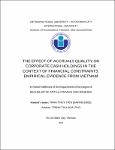The Effect Of Accruals Quality On Corporate Cash Holding In The Context Of Financial Constraints: Empirical Evidence From Vietnam
Abstract
Liquidity is one of the fundamentals for issue-free daily business operations. In
relevance to how enterprises maintain and manage liquidity, the pecking order theory
suggests that there are priorities in sources of funding, that is, firms favor internal funding
because of its lower cost of financing compared to external funding, which traces back to
the concept of information asymmetry between two negotiating parties - firm managers
and outside investors. Acknowledging the importance of how liquidity management
associates with information asymmetry, this study investigates the effect of accruals quality
on corporate cash holding and examines whether the effect is more pronounced for firms
facing financial constraints. The paper takes financial data from a sample of 658 listed
companies excluding financial firms on Ho Chi Minh Stock Exchange (HOSE) and Hanoi
Stock Exchange (HNX), the two largest Vietnamese stock exchanges within a long
timeframe from 2010 to 2022. To measure accruals quality, the Kothari et al. (2005)
version built up on the Jones (1991)’s model of performance-matched discretionary
accruals is utilized as a proxy, where accruals quality of the firm decreases as the calculated
discretionary accruals increases. Pooled OLS regression, Fixed-effect model (FEM), and
Random-effect model (REM) are then employed to test the hypotheses. The results indicate
that there exists a negative impact of accruals quality on the amount of cash holding, that
is, firms exhibiting low earnings quality tend to have higher cash holding. However, the
findings also reported no statistically significant evidence to support the idea that financial
constraints enhance this effect. Altogether, this study aims to raise awareness to experts of
the determining role of accounting decisions in liquidity management and corporate
governance. Moreover, the findings of this study contribute to the literature on corporate
cash holding in the Vietnamese market where the information asymmetry is still extremely
high.


